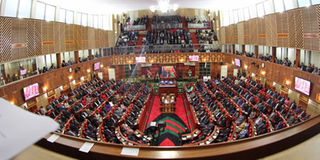Ndhiwa legislator Agostino Neto wants number of MPs reduced

The National Assembly chambers. Ndhiwa legislator Agostino Neto has proposed amendments to the Constitution to reduce the number of MPs May 14, 2013. FILE
What you need to know:
MP argues amendments aimed at reducing the wage bill, fix the number of MPs, have constituency boundaries reviewed in terms of population distribution and create a legal system to help attain the gender principle.
Mr Neto’s suggestion would necessitate the amendment of nine sections of the Constitution approved in 2010; Articles 82 (b), 88 (k), 89 (1), 97 (c), 98 (b), 98 (c), 98 (d) and 101.
Ndhiwa legislator Agostino Neto has proposed amendments to the Constitution to reduce the number of MPs.
Mr Neto argues his amendments are aimed at reducing the wage bill, fix the number of MPs, have constituency boundaries reviewed in terms of population distribution and create a legal system to help attain the gender principle.
The youthful MP also wants to have the Presidential and Parliamentary elections held on different dates “to help foster democracy”.
Mr Neto is a former activist and he announced his proposal on the same day activists staged an Occupy Parliament protest at the main entrance to the National Assembly.
He also aims to remove the provision for Nominated MPs.
Mr Neto’s suggestion would necessitate the amendment of nine sections of the Constitution approved in 2010; Articles 82 (b), 88 (k), 89 (1), 97 (c), 98 (b), 98 (c), 98 (d) and 101.
“The proposed amendments will help in the realisation of rights, especially on the election of Women MPs. The amendments will have a direct budgetary implication as it will help in reducing the wage bill by having few MPs,” he says in his letter to the Speaker of the National Assembly.
He has asked the Speaker to “find the amendments worthy of consideration and permit debate on the same.”
Mr Neto says the deletion of Article 82 (b) would ensure nobody is nominated as MP and 88(k) would also be deleted. He proposes to have only 304 MPs- 210 from the constituencies and 94 consisting two women MPs from each of the 47 constituencies.
He proposes to have the number of MPs fixed at 304 and boundaries would be reviewed after every census, with the Independent Electoral and Boundaries Commission adjusting the boundaries appropriately.
Mr Neto proposes that the Senate constitute 19 women elected from counties, three adjacent counties constituting single-member constituencies. The IEBC would be responsible for determining which counties form single constituencies.
He has also proposed that a general election of MPs be held on the second Tuesday of December every fifth year.




